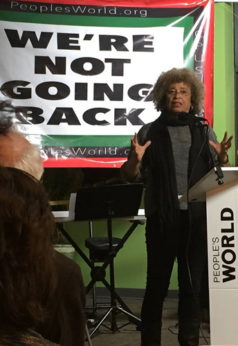
NEW YORK CITY – Speaking March 4 to a packed crowd at the headquarters of the New York District of the Communist Party USA, noted activist and scholar Angela Davis said that “we will not be able to get through this period without a critique of capitalism … [which] has invaded … the most intimate moments of lives.”
Many in the audience had come to hear Davis and other speakers immediately after participating in the People’s March for Education Justice, and a March for Standing Rock.
Introducing Davis, Zenaida Mendez shared with the audience the inspiration she had been to her family as a child. She said that Davis was “important to our history” … and that “we must reclaim our history.” Mendez is director of the Manhattan Neighborhood Network’s El Barrio Firehouse Community Center.

Davis, recently retired from a professorship at the University of California Santa Cruz, said that “So much suffering has been produced by the effects of global capitalism. The 2.5 million people behind bars has a lot to do with the … deterioration of welfare state.”
She said that there are now “huge numbers of people with nowhere to go – no house, no healthcare, and no education … This is the population targeted by the prison industrial complex,” and is “why so many people of color are behind bars.”
She continued, “As soon as Trump was elected he called on private prisons “to guarantee 80,000 immigrants are incarcerated every day. … Private prisons are responsible for the most repressive anti-immigration legislation … because government detention is the most profitable sector of the prison industrial complex.”
She stressed that the struggles for gender and racial equality are “at the center of the struggle for democracy. … Such movements, she said, “once marginalized as ‘identity politics,’ including [today’s] fight to end violence directed against transgender women of color, have been the spark and spur of movements for democracy in the United States.”
She said that the “Abolitionist movement, the Civil Rights movement, the immigrant rights movement and similar struggles “have most expanded democracy in the U.S.”
Davis stressed that to win, the progressive movement must create “different models of leadership – collective leadership rather than individualistic, masculine, charismatic leadership.” And she emphasized the “importance of women of color in the Resistance” who have “only recently been assuming leadership roles.”
Davis concluded by saying she is confident to place the future of the struggle in the hands of today’s youth. “[They] have more insights than anyone I know. If anyone knows the way we should be heading, [they] do,” she said.
Many speakers sharing the podium with Davis pointed to the Women’s March on January 21, the spontaneous response to the Muslim ban and mobilizations at local town halls across the country as evidence of the growing unity and resistance to the Trump agenda.
Peter Gale, chair of the Elizabeth Gurley Flynn club of the CPUSA said that with the election of Donald Trump as president, “Peace in the world is at risk and our Constitution is at risk. I’m talking about our Bill of Rights.”
Gale set the tone of the evening by reminding participants that “unity can win.”
Jarvis Tyner, Chair of the New York District of the CPUSA; said “When Reagan got in there, he was talking the same crap [as Trump], but ultimately he was defeated.
“Fighting oppression,” Tyner said, “is good for the soul. It heals wounds and makes you a better person.”
“My family grew up in Jim Crow,” Tyner continued. “That was fascism. You couldn’t go to the movie theater. You couldn’t get a job. Martin Luther King knew he might lose his life,” but “they found the tactics and they overthrew Jim Crow. That was a big victory for the people.”
Tyner presented a plaque to commemorate the work of Charlene Mitchell, a “working class hero and long term fighter for the 99 percent.” Mitchell was “a leader of CPUSA and the National Committee to free Angela Davis who labored in vineyards of class struggle for a lifetime.”
Returning to the theme of unity, Estevan Bassett-Nembhard, New York District organizer of the CPUSA, said “This unity must be a bottom-up unity with the diverse working class, the 99 percent, leading the fight for equality … .”
Zakiyah Ansari, advocacy director for the Alliance for Quality Education noted the importance of making sure the voices of the most vulnerable and marginalized are front and center and can put forward the solutions in the fight for equality.
Unity must be built not for its own sake, but with the objective of changing the structures of society, said Leslie Cagan, former national coordinator of United for Peace and Justice.
Annie Allen, Pastor of Turning Point United Methodist Church concluded the evening by saying. “We have a lot of work ahead of us. God bless everybody. Keep up the struggle, keep being inspired, and keep fighting for our families.”
In addition to the speakers, poets Amina Baraka and Staceyann Chin sang and read poems.
Along with Mendez, Flavio Casoy helped emcee the event. Casoy is president of the People Before Profits Education Fund, which co-sponsored the event with the New York District of the Communist Party USA.










